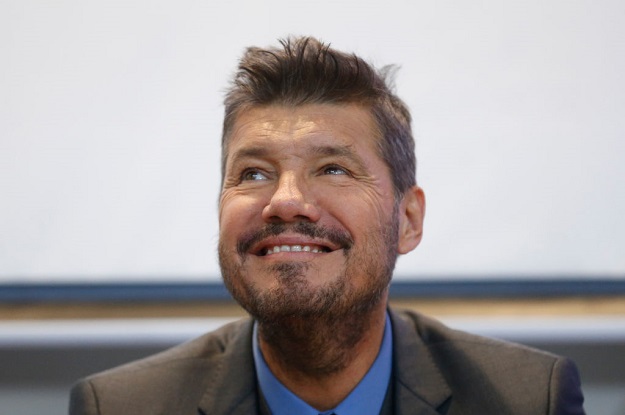BUENOS AIRES – Brazil and Mexico have their “outsider” presidents. Is Argentina next?
With presidential elections set for October, possible challengers to President Mauricio Macri are already jockeying for position. One figure capturing particular intrigue here is Marcelo Tinelli, a TV host who some believe could throw his hat in the ring if economic woes and corruption scandals provoke a spike in anti-establishment sentiment.
A household name in Argentina, Tinelli, 58, is a wealthy businessman and vice president of San Lorenzo, one of the country’s largest football clubs. He’s also been the host of Argentina’s most popular TV show, Showmatch, for over 25 years, during which the program has wielded substantial political influence. His public profile and lack of baggage could give him an edge over rivals, particularly as disapproval ratings for the leaders of the two major parties, Macri and former President Cristina Fernández de Kirchner, clocked in at 57 and 63 percent respectively in one late October poll.
For months now, Tinelli has made vague allusions to the possibility of running for office, telling Clarin last month that he was analyzing the political landscape with his team. If he runs, analysts expect it would be within a newly formed informal coalition of moderate Peronists who don’t align with Fernández, but also don’t have a leader among them with a clear advantage in 2019. Three of the coalition’s four leaders – Sergio Massa, Miguel Pichetto and Juan Manuel Urtubey – have courted Tinelli publicly, assuring he would be a valuable addition to their movement.
By representing the coalition, Tinelli could run as an alternative for centrist voters, navigating between Fernández’s leftist faction of Peronism and Macri’s center-right Cambiemos coalition.
Tinelli’s measured public political statements have made it difficult to surmise how he’d govern. He has hinted at a preference for protectionism, telling Clarín that he always “bets on national industry and the creation of jobs.” And if he runs with the non-kirchnerista Peronist coalition, he would likely echo their message of renewal, aimed at overcoming political division but still critical of the current and former administrations.
“There is frustration with the political leadership,” said Lucas Romero, associate director for Synopsis, a pollster. “To say ‘I come from outside’ is an asset.”
Conditions are increasingly favorable for the rise of such an option: The two parties that have dominated national politics over the last decade have come under growing scrutiny. Cambiemos’ reputation has been deteriorating steadily since the beginning of Argentina’s latest financial crisis; meanwhile, Fernández continues to face indictments for her alleged roles in multiple corruption cases.
Tinelli could help the Peronists outside Fernández’s circle who, according to recent polling, have been unable to capitalize on popular discontent. An October Synopsis poll put their support among voters at just 10.6 percent, with Macri and Fernández’s blocs at a healthy 32.9 percent each. Their struggles of the moderate Peronist coalition may stem from the fact that all four of its leaders have held public office for at least a decade and could each be considered part of the political establishment – a likely handicap in a regional political climate favoring insurgents.
“Being perceived as an outsider is an attractive feature at the moment,” Romero said. “Tinelli’s message would be based on that.”
While he is not strictly speaking a political outsider – soccer and politics are, after all, tightly intertwined in Argentina – Tinelli’s advantage could lie in the fact that he is perceived as such. Tinelli has never organized a political event or held public office and, more importantly, he has never been part of an administration. His ability to stay above the fray as an observer and critic rather than participant could give him a leg up at a time if voters grow increasingly dissatisfied with their options.
Another advantage? Tinelli’s talent for shaping public opinion, which he’s honed for years on Showmatch. In segments like “Big-Brother-in-Law,” a parody of the reality show Big Brother, the mockery of politicians can be biting. Former President Fernando De la Rúa even accused Tinelli of contributing to the fall of his administration by portraying him as a clueless, useless president.
Examples of Tinelli’s influence span decades. Former President Carlos Menem made the last public appearance of his 1995 reelection campaign on Tinelli’s show. More recently, in 2015, all three main presidential candidates – Macri, Massa, and Daniel Scioli – appeared on Showmatch just days before Argentines headed to the polls.
Whether Tinelli is ready to switch roles is unclear. For now, he appears to be taking a wait-and-see approach. In an interview with Infobae in early November, Tinelli refused to confirm or deny presidential aspirations, but said he was fascinated by “anything that serves and improves the quality of life.”
“He will probably decide in March. Everything is extremely volatile and premature right now,” said Mariel Fornoni, head of the pollster Management and Fit, noting the unpredictable nature of Argentine politics. “There have been many presidents who, six months before the elections, were not among the potential candidates.”
—
Bio is an Argentine journalist and political writer for The Bubble







